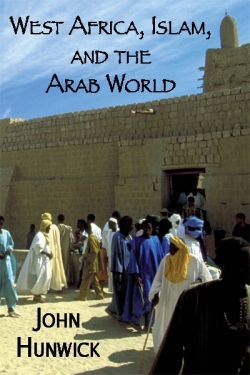 West Africa is defined as the area south of the Sahara between the Atlantic and Lake Chad, encompassing the Sahel zone, tropical forests, and pasturelands. West Africans speak languages belonging to three major families: Niger-Congo, Nilo-Saharan, and Afro-Asiatic, as well as the official languages, French and English, introduced in the nineteenth and twentieth centuries. The language of scholarship and learning has been Arabic since the seventh century, when Arab merchants, soldiers, and missionaries came south and established major trade routes. Timbuktu became a center of commerce and learning, and kingdoms such as Ancient Ghana emerged as major regional powers. This study, which provides an overview of the region’s history from medieval times to the twentieth century, traces the developments following colonialism; the effects of Arab nationalism on West African politics; the role of the Israelis in helping to develop new states; the politics of OPEC; and the rise of Islamic extremism.
West Africa is defined as the area south of the Sahara between the Atlantic and Lake Chad, encompassing the Sahel zone, tropical forests, and pasturelands. West Africans speak languages belonging to three major families: Niger-Congo, Nilo-Saharan, and Afro-Asiatic, as well as the official languages, French and English, introduced in the nineteenth and twentieth centuries. The language of scholarship and learning has been Arabic since the seventh century, when Arab merchants, soldiers, and missionaries came south and established major trade routes. Timbuktu became a center of commerce and learning, and kingdoms such as Ancient Ghana emerged as major regional powers. This study, which provides an overview of the region’s history from medieval times to the twentieth century, traces the developments following colonialism; the effects of Arab nationalism on West African politics; the role of the Israelis in helping to develop new states; the politics of OPEC; and the rise of Islamic extremism.
|
|||
West Africa, Islam, and the Arab WorldJohn Hunwick (Northwestern University) is a specialist in the history of Timbuktu, where a new library has been named after him. He is the co-author with Eve Troutt Powell (University of Pennsylvania) of The African Diaspora in the Mediterranean Lands of Islam, author and translator of Jews of a Saharan Oasis: The Elimination of the Tamantit Community (both available from Markus Wiener) and of other books, including Shari’a in Songhay and Timbuktu & the Songhay Empire. |
|||
|
© 2025 Markus Wiener Publishers - All Rights Reserved
231 Nassau Street Princeton, NJ 08542 Telephone: 609-921-1141 Fax: 609-921-1140 Powered by WordPress & Atahualpa |
|||
